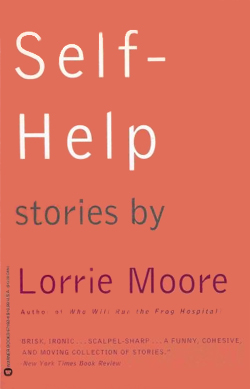

I’ve written a lot on older literature, poems and stories from centuries ago, and because of this, I’ve decided to write about a modern author this week. I was introduced to the stories of Lorrie Moore last year, and I instantly fell in love with them. Their acerbic wit and sense of humor appealed to me immediately, and I’ve been reading her ever since. I’ve chosen “Go Like This,” a short story from her first published collection, Self-Help, as today’s topic. Many of Moore’s stories touch on death, but this one is particularly appropriate, as it concerns a woman who comes to terms with her cancer diagnosis and decides that she is ready to die.
The main character, Liz, an author, makes the decision to commit suicide after she is diagnosed with cancer; not because she is depressed, but because she has thoroughly thought it through and has accepted that she must die. She refers to this as “rational suicide—no oxymoron there” (Moore 67), taking care to note that she has made the decision with full lucidity. She explains, “A month ago I was told I have cancer. It was not the clean, confined sort I might have hoped for…It had spread through my body like a clumsy uninvited guest who is obese and eats too much, still finding, filling rooms” (Moore 67). Even in the midst of terrible news, Liz is lighthearted about her situation.
In reference to her decision to end her life, Liz says, “I have decided on Bastille Day. It is a choice of symbol and expedience. Elliott will have time enough before he begins teaching again in the fall. Blaine will not go to camp this year and can spend some time with Elliott’s folks upstate” (Moore 69). Once again she shows that she has thought this through and has her plans all set. Next she shows her comical side again when she states, “As it will be unbearably hot, I’m sure, I will tell everyone to wear light clothes. No black, no ties, no hats, no coats. The dead are cruel to inflict that misery in July. Open-toed shoes and parasols de rigueur, I will tell everyone” (Moore 69). In this way Liz reveals to us that she is accepting of her death, and capable of having a sense of humor about it.

The protagonist even lets all of her closest friends in on the plan: “I have invited our closest friends over tonight…I say I have chosen suicide as the most rational and humane alternative to my cancer, an act not so much of self-sacrifice as of beauty, of sparing. I wanted their support” (Moore 71). Here, Liz expresses the fact that she does not want their pity, because she is making a conscious choice to do this. It is not a tragedy that she is ending her life, but merely a more “sparing” and “humane” way of bringing it about. She goes on, “I am not afraid of death…I am afraid of what going on like this will do to me and to my daughter and to my husband” (Moore 72), and then “I am getting into the swing of it. I tell them the cancer is poisoning at least three lives and that I refuse to be its accomplice. This is not a deranged act, I explain” (Moore 72). Liz feels that if she continues on in this way, she is acting as the “accomplice” to her cancer, which she does not agree with. She clarifies that her intentions are meant for the better of those around her, not for the worse.
When one of her friends disagrees with her decision, Liz retains her sense of humor: “It’s crap, Liz. There’s no such thing as an aesthetic suicide. You’re not going to be able to stand back afterward and say by jove what a damn good thing I did of it…It’s deluded. It’s a power play” (Moore 73). Liz’s reply is simply, “I appreciate your candor, William” (Moore 73). When she thinks it over, she considers how she thought it would go when she told her friends of her plan: “…we would all agree (my reasoning flawless) that my life ultimately meant my death as well and that it was a right both civil and humane to take whatever actions my free will so determined…” (Moore 75). Thus Liz reiterates her belief that she is merely taking on her death triumphantly, and that she is perfectly within her rights to do this.
The day before she has planned to take her life, Liz talks to Elliott about her final book (she writes a series of children’s books about a character named William): “Tomorrow’s Bastille Day, Elliott, and I want what I’ve written for the fourth William book changed. So far William thinks he forgot his umbrella and wanders all over the city looking for it, misfortune following him like an odious dog, until after he is splashed by a truck and nearly hit by a cab, he goes home only to realize he never forgot his umbrella at all. I want that changed. I want him to have all kinds of wonderful, picaresque adventures so that it doesn’t even matter if he has lost his umbrella or not. Can you change that for me? (Moore 80). This is symbolic of Liz’s newfound optimism, now that she has decided what she wants to do; she is not cynical or scared of death, but rather, sees it as a release and amelioration of her current situation. She wants her final written words to reflect this attitude, rather than her previous negativity. And at the end of the story, when she dies, she gets what she has been wanting.

 “Go Like This” by Lorrie Moore
“Go Like This” by Lorrie Moore


 Debating Medical Aid in Dying
Debating Medical Aid in Dying
 “Help Me, Helen”
“Help Me, Helen”















